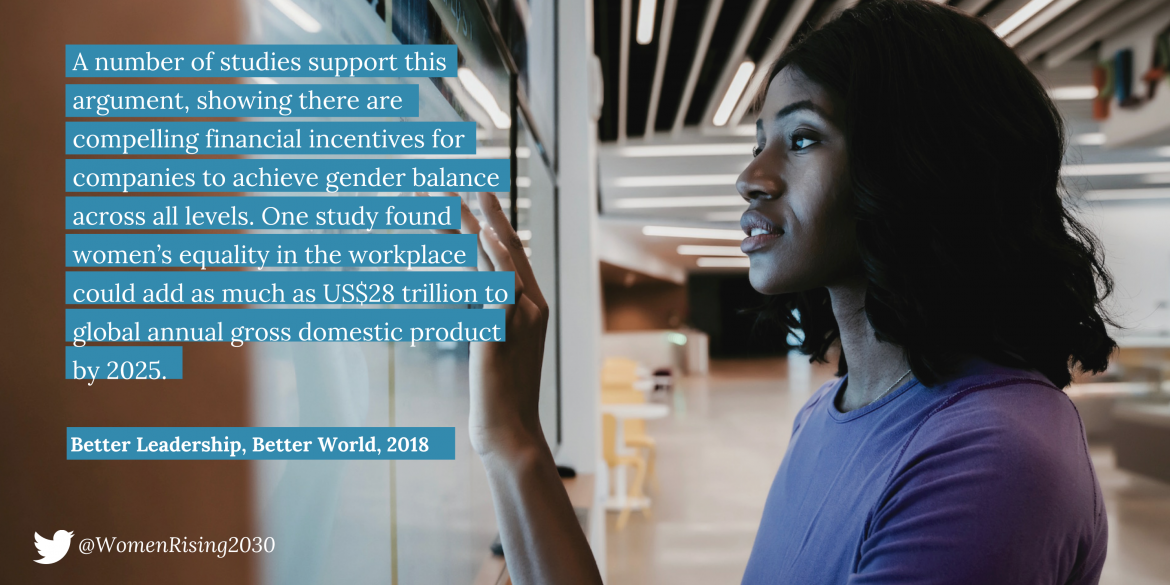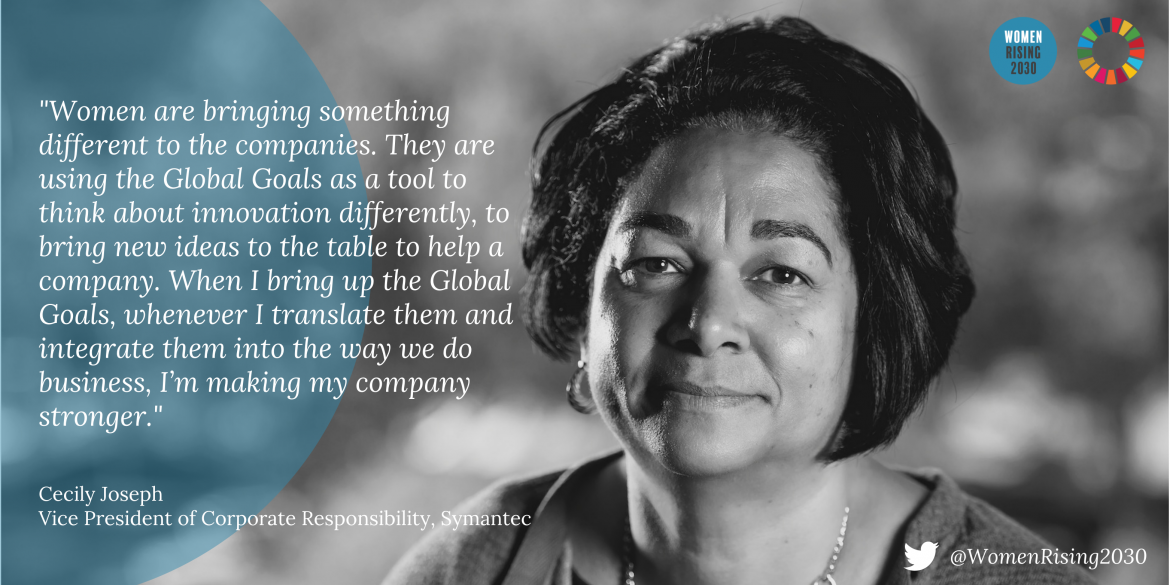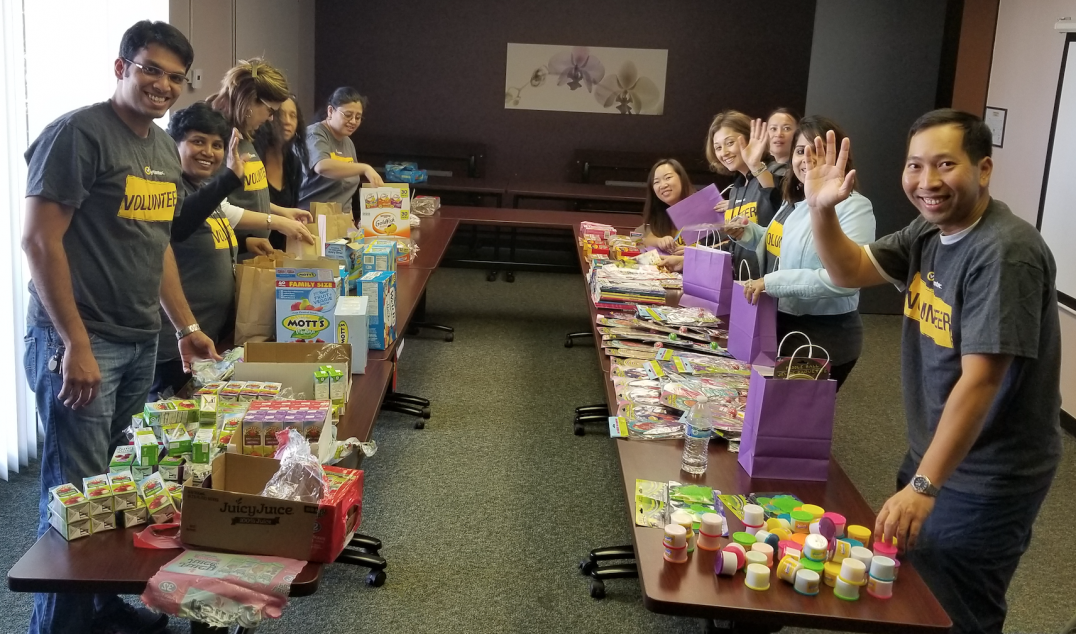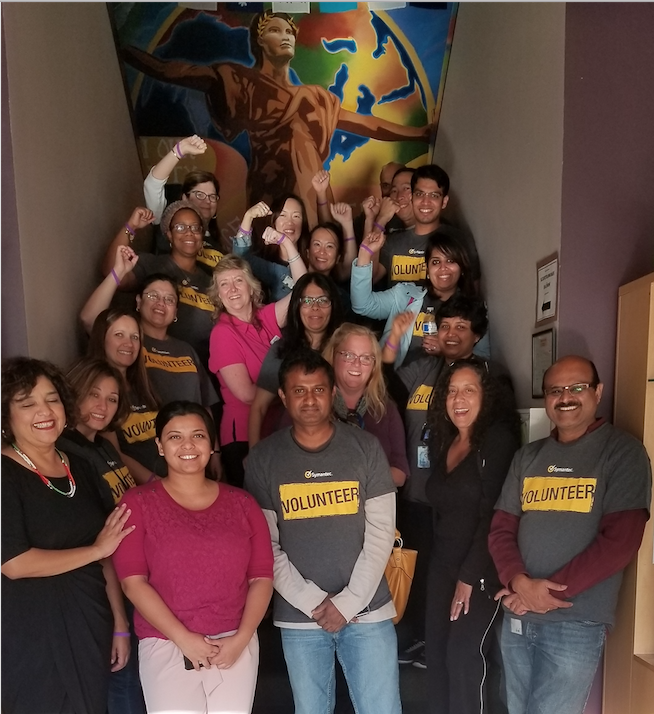Why Gender Equity Builds Better Leadership and a Better World
Celebrating International Women's Day & Symantec's Support of Women's Empowerment
Symantec blog | Corporate Responsibility
by Cecily Joseph, VP, Corp Social Responsibility
According to the Female Quotient, a global movement promoting female diversity in business, “When you put women in any equation, the equation gets better.”
And the numbers prove this. Launched today, the “Better Leadership, Better World: Women Leading for the Global Goals”report by the Business and Sustainable Development Commission highlights the value that gender balance brings to business and our world. As the report highlights, according to The McKinsey Global Institute, a further US$28 trillion could be added to global annual GDP by 2025 if women and men were to participate equally in the economy. [1]
The report analyzes the unique strengths and skills sets of female leaders, and gender balanced teams, that will contribute to advancing the 17 United Nations Sustainable Development Goals (or Global Goals). For example, females tend to exhibit long-term thinking, innovation, collaboration, transparency, environmental management, and social inclusiveness, all critical to harnessing what research argues is the “greatest economic opportunity of our time”.
Recognizing and harnessing these qualities represents a huge opportunity as gender inequality touches everything, creating fundamental barriers across all of the 17 goals:
- SDG1: No Poverty: Globally, women and girls are over-represented among the poor: 330 million women and girls live on less than US$1.90 a day, that’s 4.4 million more than men[2].
- SDG4: Quality Education: As of 2015, approximately 781 million people 15 and older were illiterate, with two thirds of these women, a proportion that has remained unchanged for two decades. If every women in sub-Saharan Africa and South and West Asia could have access to a secondary education, child marriage would be reduced by two thirds [3]
- SDG5: Gender Equality: Human trafficking is the third largest international crime industry and 71% of global human trafficking victims are women and girls[4]. The International Labour Organization estimates that women and girls represent the largest share of forced labor victims.
- SDG6: Clean Water and Sanitation: Women and girls are responsible for water collection in 80% of households without access to water on premises[5].
- SDG8: Decent Work & Economic Growth: Globally, the labor force participation rate among prime working-age women (aged 25–54) stands at 63% compared to 94% among their male counterparts. The global gender pay gap is 23%.[6]
- SDG13: Climate Action: Climate change has a disproportionate impact on women and children, who are 14 times as likely as men to die during a disaster[7}
At Symantec we recognize our opportunity to empower females both inside and outside of company, starting with protection of basic human dignity and human rights.
We join over 9,500 companies that have committed to embed the Ten Principles of the UN Global Compact into their business strategies and operations, including expectations that our employees, contractors, and suppliers adhere to Symantec’s Code of Conduct and Human Rights Policy.
We have a zero-tolerance policy on any aspect of human-trafficking related activities that we maintain via policies, training and awareness, thorough auditing and confidential/anonymous reporting via our Ethics Line (managed by an independent third party). Additionally, reporting and transparency is required by law in the United States (California Supply Chain Transparency Act) and England (Modern Slavery Act of 2015), and requested by stakeholders across the world.
We adhere to the Responsible Business Alliance that establishes standards in treating workers with respect and dignity, and prohibits the use of forced, bonded, and indentured labor and involuntary prison labor. 100% of our suppliers have completed a self-assessment questionnaire, and 48% officially have these requirements included in their contracts. Additionally, as a best practice in onboarding suppliers we are incorporating human rights questions as part of the procurement process.
However, it isn’t just about our direct impact, it’s about breaking down the barriers I mentioned earlier such as opening doors to STEM education and the growing number of cyber security jobs, enabling nonprofits to serve their missions more effectively through our software donation program, and improving infrastructure – such as access to water – that detracts from a women’s ability to educate herself or start a career.
For example, to date we have supported over 150 organizations addressing domestic violence and human trafficking through employee volunteering, donations and our software donation program with TechSoup. As part of our 2017 Global Service Week, we volunteered with NextDoor Solutions to provide bags for children waiting while their parent meets with domestic violence counselors. Through our partnership with Ruby’s Place in Hayward, California, we have provided support for their comprehensive wellness based program, including shelter and services, for survivors of domestic violence and human trafficking.
Women are rising up, but there is so much more we can do
We know that companies and teams with a gender balance perform better, that our world benefits greatly when we expand opportunities for females, and it goes without saying that this is the right thing to do.
According to the “Better Leadership, Better World” report, BlackRock Inc., the world’s biggest asset manager, believes so much in the value of gender equity that they now ask companies with fewer than two women on their boards to explain how and when they will recruit more.[8] So why do we struggle to truly move the needle on gender equity?
Leaders – whether females, males, engineers, human resources, corporate responsibility or the C-suite - we all must recognize that equity is our joint responsibility.
When we view this balance of diverse talents, strengths and perspectives as a true value driver, then stamping out practices that are simply wrong and investing in this balance just makes perfect sense, creating businesses - and more importantly a world - we can be proud to be a part of.
[1] “Better Leadership, Better World: Women Leading for the Global Goals” / McKinsey Global Institute. September 2015. “The Power of Parity: How Advancing Women’s Equality Can Add $12 Trillion to Global Growth.” https://www.mckinsey.com/global-themes/employment-and-growth/how-advancing-womens-equality-can-add-12-trillion-to-global-growth
[2] Turning Promises into Action: Gender Equality in the 2030 Agenda for Sustainable Development
[3] http://globalgoalscast.org/girls-and-education
[5] Turning Promises into Action: Gender Equality in the 2030 Agenda for Sustainable Development
[6] Turning Promises into Action: Gender Equality in the 2030 Agenda for Sustainable Development
[7] Turning Promises into Action: Gender Equality in the 2030 Agenda for Sustainable Development
[8] “Better Leadership, Better World: Women Leading for the Global Goals” / “BlackRock: Companies Should Have at Least Two Female Directors” Krouse, S. 2 February, 2018. The Wall Street Journal. https://www.wsj.com/articles/blackrock-companies-should-have-at-least-two-female-directors-1517598407





